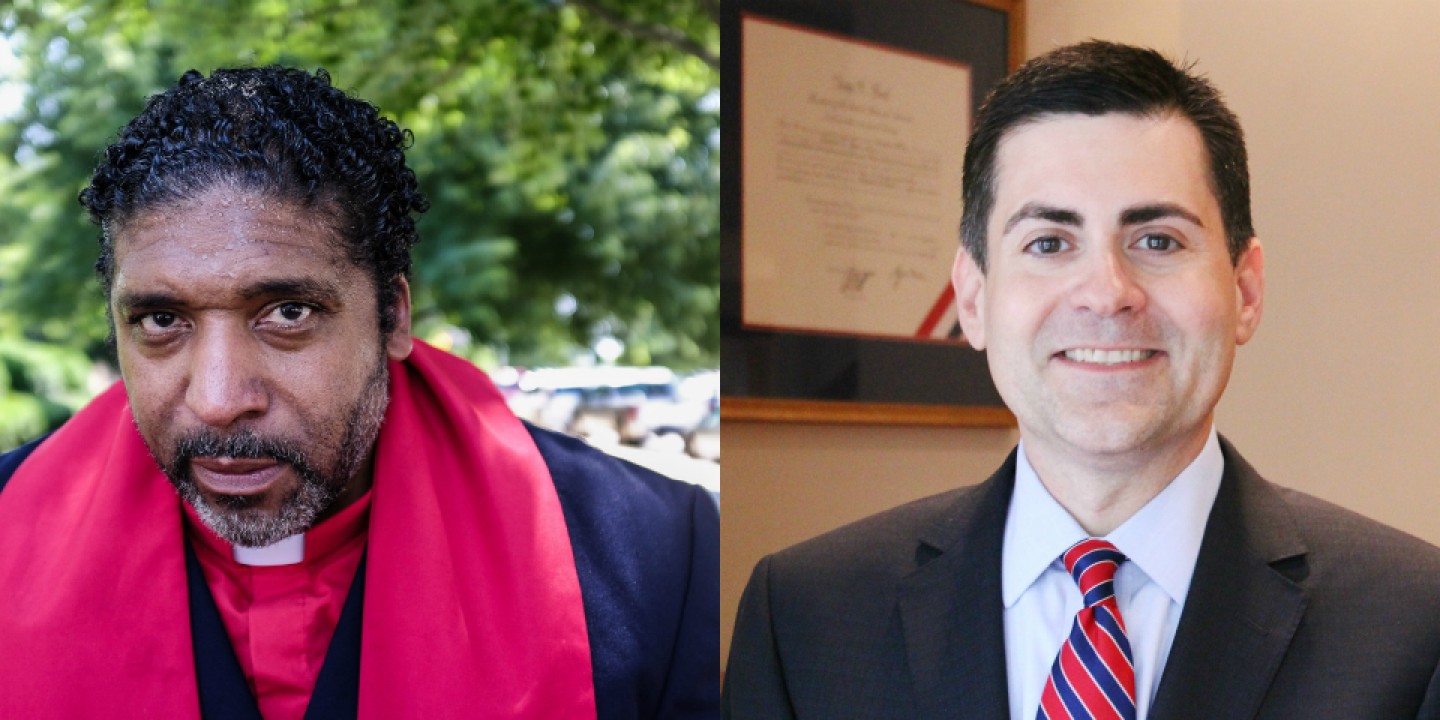Niebuhrians left and right
Religious leaders as different as William Barber and Russell Moore reflect Reinhold Niebuhr's insights.

Over the past two years I’ve been involved with the production and launch of An American Conscience, a documentary film on theologian Reinhold Niebuhr directed by Martin Doblmeier. When I attended screenings, participated in panel discussions, or chatted with someone who had seen the film on public television, I frequently heard people say that Niebuhr’s insights remain strikingly relevant, and that we sorely need his brand of public theology today.
Niebuhr’s voice is able to cut through the din and confusion of our era, whether it’s through the powerful words of the Serenity Prayer or an insight from a classic work like Moral Man and Immoral Society or The Irony of American History. Niebuhr’s comment that politics is “where conscience and power meet,” or his remark that democracy is a “proximate solution to insoluble problems,” continues to grab our attention. In his interview for the film, Stanley Hauerwas, an ethicist and noted critic of Niebuhr, observes that Niebuhr “has a kind of immediacy that you have to be impressed by.” Hauerwas quips, “I’ve learned a hell of a lot from him in terms of how to write a provocative sentence.”
Read our latest issue or browse back issues.
It is tempting to deploy a pithy Niebuhr quote simply to add credibility and verve to our arguments against the other side. But when we merely plunder Niebuhr’s thought for zippy one-liners, we add to the political confusion rather than address it. Niebuhr’s daughter, Elisabeth Sifton, notes in the film that “the speed of communication and the social media world tends to flatten everything out—everything has to be understood instantly or misunderstood. There’s not a possibility of genuine human intercourse in all of that.”
Those who attempt a deeper dive into Niebuhr will find a thinker not easily categorized or summarized. Niebuhr was committed to working within political institutions, organizations, and movements, and he was not afraid to take sides on political issues, but at the same time he was aware that even the most carefully crafted, well-intentioned political platform could easily be hijacked for ethically dubious ends.
Niebuhr was also not afraid to change his mind. In the 1920s he was a pacifist, but in the early 1940s he became a vocal proponent of U.S. intervention in World War II. In the 1930s he was a Marxist, yet he later helped shore up the theoretical foundations of American democracy. He spoke regularly of the corrupting character of power, yet as America emerged as a world leader in the 1950s he worked among the powerful—offering national leaders advice on how to use power prudently and humbly.
These political shifts elicited sharp criticism. As New York Times columnist David Brooks observes in the film, “When you change your mind in public and if you’re a public figure and public intellectual, your friends hate you and your enemies hate you more. You would think if you said, ‘I was wrong, I actually agree with these people,’ they would welcome you with open arms. But that’s not the way the world works. They sense weakness in you and they pounce.”
Niebuhr came to know these reactions well. Yet given his intellectual humility and quest for theological authenticity in a complex world, he was willing to risk the ire of both critics and allies. In his view, human affairs play out before a God who “understands and resolves the perpetual contradictions in which history is involved, even at the highest reaches of human achievements.” Faith helps us discern these contradictions and become participants in the divine work of resolving them. If we accept the fact that politics bristles with contradictions, we will be receptive to constructive criticism. If we see ourselves as participants in God’s redemptive work, we will enter the political fray with energy and passion. If we remember that in the light of God the nations are a drop in the bucket, we will resist the temptation to gloat in our victories or despair in our defeats. And we will see unquestioning loyalty to one party, ideology, or person for what it is: a form of idolatry, a claim to a degree of permanence that God alone possesses.
For Niebuhr, honest engagement with the world begins with acknowledging that the world is a complicated, broken place, and that we are complicit in that brokenness. Only when we’ve come to terms with our complicity can we truly begin the difficult yet spiritually edifying task of working toward justice.
Voices that are both realistic about the way things are and hopeful about how they can be are tough to find in our time. But I would point to two figures, on different sides of the political divide, who are attempting such work.
Russell Moore, president of the Ethics and Religious Liberty Commission of the Southern Baptist Convention, speaks on public policy for the largest conservative evangelical denomination in the United States. In that role, he has challenged his own constituency by sharply criticizing Donald Trump’s behavior and pressing for racial reconciliation and acknowledgment of climate change. His behind-the-scenes negotiations helped salvage a motion condemning the alt-right at the SBC’s 2017 annual meeting.
A Niebuhrian figure on the left is William Barber II, founder of the Moral Mondays protests in North Carolina. Through the Moral Mondays movement, Barber has worked to build coalitions across lines of race, religion, and gender within mainline churches. But he has also pushed the mainline in a more radical direction by relaunching the Poor People’s Campaign, deliberately recovering a radical program originated by Martin Luther King Jr. Barber unabashedly uses Christian language to call for a “national moral revival.” If Moore showcases a Niebuhrian instinct for self-critique, Barber demonstrates a Niebuhrian appreciation for how biblical claims can radicalize politics. Both challenge us to confront the gap between our ideals and our behaviors.
Figures like these show, as Niebuhr did, that wise guidance in times of political crisis can come from religious leaders. Like Niebuhr, Moore and Barber understand that a healthy politics requires more than good policy or slick propaganda; it requires an awakening of conscience. Across the political spectrum, we need voices that call us not to self-aggrandizement but to repentance.
A version of this article appears in the August 30 print edition under the title “Realism without despair.”





